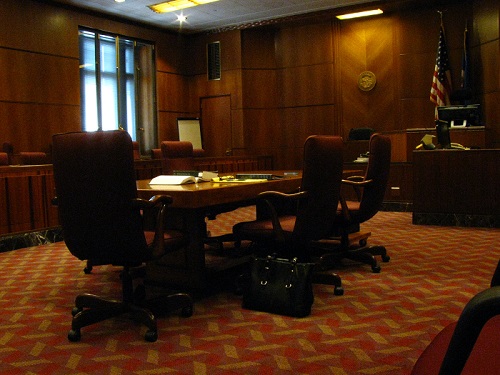 Apparently it was a big deal last week when U.S. Supreme Court Justice Clarence Thomas broke his decade-long silence on the bench and began ask counsel several questions during oral arguments. Maybe Thomas spoke up was because this particular case (involving 2nd Amendment gun rights) was a subject he is passionate about, or maybe he had previously been hiding in “Nino’s” shadow all these years (as the graph might suggest). In any event, this news event raises the subject of addressing the bench, encouraging judges to ask questions, and hopefully providing accurate and persuasive answers in response.
Apparently it was a big deal last week when U.S. Supreme Court Justice Clarence Thomas broke his decade-long silence on the bench and began ask counsel several questions during oral arguments. Maybe Thomas spoke up was because this particular case (involving 2nd Amendment gun rights) was a subject he is passionate about, or maybe he had previously been hiding in “Nino’s” shadow all these years (as the graph might suggest). In any event, this news event raises the subject of addressing the bench, encouraging judges to ask questions, and hopefully providing accurate and persuasive answers in response.
Indeed, lawyers should pray for a rainstorm of questions from the bench. A judge who has no questions might have already decided on the matter at hand (or not read your brief or memorandum). Probably nowhere should you hope for questions more than when you are presenting and arguing a motion. (After all, you are asking the court to diverge from its otherwise-planned path.) So anticipate those questions and be ready to offer brief-but-enlightening answers with which you can engage the judge in a stimulating informational discourse. To this end, we offer some helpful materials:
- Motion Practice (6th Ed.) by D. Herr, et al. Its chapter 6.05 on oral argument specifically presents tips for answering the questions a judge is likely to ask.
- A Checklist Approach to Successful Practice (CLE 2015) contains “8 Ways to Make the Most of Oral Argument,” an excellent three-page tip sheet for communicating successfully with the judge.
- The end chapters of informal-but-informative McElhaney’s Trial Notebook (4th Ed.) for helpful lessons on set against story narratives on making your points and handling questions from the bench.
- Consider reading “[T]he Judge Looks Bored: How to Keep the Judge Interested.” Here, Hennepin District Judge Jay Quam offers his own tips to lawyers for successfully interacting with the judge. (Minnesota Bench and Bar, Dec. 2011)
You may be presenting your argument at the appellate level, which means multiple judges. If so, consider “[T]he Word on Oral Arguments” by David Ziemer (Minnesota Lawyer, May 25, 2005). Ziemer reminds you to be confident, considering that your case was taken because the court wants to hear more about it and possibly give it precedential significance. Extensive questions in the appellate setting mean that the judges have not only read your brief, but are considering policy ramifications of their possible decision options. Ziemer also provides tools to help you focus the attention of the judges. (A recitation of multiple dry details will only have a tranquilizer effect on them.)
All of these suggestions are short and easy reads, so come by the Law Library to check them out.